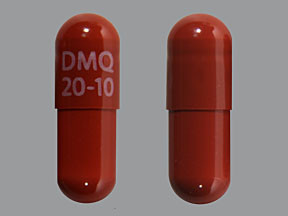DEXTROMETHORPHAN/QUINIDINE - ORAL
PHONETIC PRONUNCIATION: (DEX-troe-meth-OR-fan/KWIN-i-deen)
COMMON BRAND NAME(S): Nuedexta
GENERIC NAME(S): dextromethorphan Hbr/quinidine sulfate
Uses
USES: This medication is used to treat a certain mental/mood disorder (pseudobulbar affect). This disorder may occur due to various conditions that affect the brain (such as stroke, amyotrophic lateral sclerosis-ALS, multiple sclerosis). This medication may help decrease sudden outbursts of uncontrollable/inappropriate laughing and/or crying. This medication is a combination of 2 ingredients: dextromethorphan and quinidine. Dextromethorphan works in the brain, though it is not known exactly how it helps treat pseudobulbar affect. Quinidine is added to this medication to increase the effect of dextromethorphan.
How to use DEXTROMETHORPHAN/QUINIDINE - ORAL
HOW TO USE: Take this medication by mouth with or without food with a full glass of water (8 ounces/240 milliliters) as directed by your doctor, usually one capsule every 12 hours. Do not lie down for at least 10 minutes after taking this medication. To reduce your risk of side effects, your doctor may direct you to start this medication at a low dose (usually one capsule daily for 7 days) and gradually increase your dose. Follow your doctor's instructions carefully. Avoid eating grapefruit or drinking grapefruit juice while being treated with this medication unless your doctor instructs you otherwise. Grapefruit juice can change the amount of certain medications in your bloodstream. Consult your doctor or pharmacist for more details. Use this medication regularly to get the most benefit from it. To help you remember, take it at the same time(s) each day. Tell your doctor if your condition does not improve or if it worsens.
Side Effects
Precautions
Interactions
Overdose
Images
Reviews
Faq for DEXTROMETHORPHAN/QUINIDINE - ORAL
Dextromethorphan/Quinidine is used to treat pseudobulbar affect (PBA), a condition characterized by uncontrollable episodes of laughing or crying.
Dextromethorphan is a cough suppressant that affects a certain part of the brain, reducing the urge to cough. Quinidine is used to increase the levels of dextromethorphan in the body, ensuring its effectiveness.
Common side effects include diarrhea, dizziness, nausea, weakness, stomach pain, indigestion, and headaches.
It is usually taken twice a day, with food, as prescribed by your doctor. Follow the instructions carefully and do not increase or decrease the dose without consulting a healthcare professional.
Yes, it can interact with certain medications, such as antidepressants, antifungal drugs, blood thinners, and some heart medications. Inform your doctor about all the medications you are taking to avoid any potential interactions.
It is not recommended to use Dextromethorphan/Quinidine during pregnancy unless the potential benefits outweigh the risks. It is also not known whether this medication passes into breast milk, so consult your doctor before breastfeeding while taking this medication.
People with a history of irregular heartbeat, liver disease, or drug/alcohol addiction should use Dextromethorphan/Quinidine with caution. It may also cause drowsiness, so avoid driving or operating heavy machinery until you know how the medication affects you.
No, you should not stop taking this medication suddenly without consulting your doctor. They will gradually reduce the dosage to avoid withdrawal symptoms.
The effectiveness of Dextromethorphan/Quinidine can vary from person to person. It may take several weeks before you notice any improvement in your condition. Consult your doctor if you have any concerns.
Disclaimer
IMPORTANT: HOW TO USE THIS INFORMATION: This is a summary and does NOT have all possible information about this product. This information does not assure that this product is safe, effective, or appropriate for you. This information is not individual medical advice and does not substitute for the advice of your health care professional. Always ask your health care professional for complete information about this product and your specific health needs.

No Reviews Yet